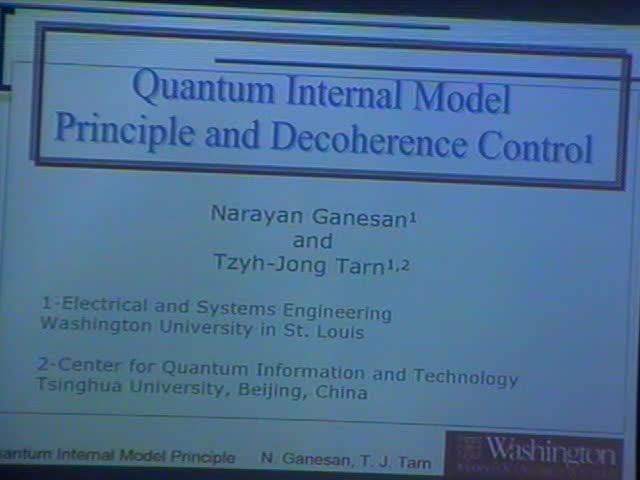Quantum internal model principle and decoherence control
Presenter
March 6, 2009
Keywords:
- Transport processes
MSC:
- 82C70
Abstract
Decoherence, which is caused due to the interaction of a quantum system with its environment plagues all quantum systems and leads to the loss of quantum properties that are vital for quantum computation and quantum information processing. In this work we propose a novel strategy using techniques from systems theory to completely eliminate decoherence and also provide conditions under which it can be done so. A novel construction employing an auxiliary system, the bait, which is instrumental to decoupling the system from the environment, is presented. This corresponds to the Internal Model Principle for Quantum Mechanical Systems. Almost all the earlier work on decoherence control employ density matrix and stochastic master equations to analyze the problem. Our approach to decoherence control involves the bilinear input affine model of quantum control system which lends itself to various techniques from classical control theory, but with non-trivial modifications to the quantum regime. The elegance of this approach yields interesting results on open loop decouplability and Decoherence Free Subspaces (DFS). Additionally, the feedback control of decoherence may be related to disturbance decoupling for classical input affine systems, which entails careful application of the methods by avoiding all the quantum mechanical pitfalls. The two concepts are contrasted and an improved theory of disturbance decoupling for general input affine systems is developed. In the process of calculating a suitable feedback the system has to be restructured due to its tensorial nature of interaction with the environment, which is unique to quantum systems. Finally the results are also shown to be superior to the ones obtained via master equations. In order to apply feedback a reliable information extraction scheme using continuous indirect measurements with the help of a quantum probe is outlined. Finally, a methodology to synthesize feedback parameters itself is given, that technology permitting, could be implemented for practical 2-qubit systems to perform decoherence free Quantum Computing.
